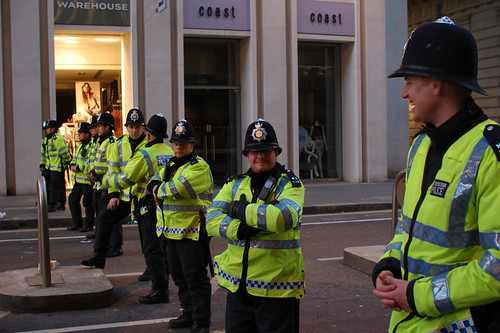Over the last three days, London has been under a curious sort of schizophrenic siege. As everyone's been reading in the news, Gordon Brown had invited the G20 came to town to chat about the global economy and figure out how to slow the meltdown. Obama was here with an entourage of 500. Clearly, he has bigger things on his plate than the defense of Sparta, which took 200 less. The Merkel-Sarkozy tag team, rekindling Franco-German friendship with the full force of necessity, stood tall and talked bravely in the face of nearly uniform and only barely concealed hostility. The Queen served tea and scones before things could get out of hand.
Sixteen other heads of state were also there, and though they didn't matter and no one needs to remember their name or their presence, they all needed to be protected. In normal times, this would require law enforcement in all its incarnations, but times are far from normal. People hear, see and feel every day how the longest boom in the history of the U.K. has turned bust. Jobs are being lost, companies go out of business and banks need to be bailed out. In the public eyes, the culprits are obvious: Those who benefited most from the boom, those who engineered it through short-term greed and long-term blindness. Now those same people walk away from nationalized banks with million-pound pensions or get outrageous bonuses for running their companies into the ground. The tax-payer picks up the tab and doesn't like it at all. The streets are filled with outrage
The last few days, since the world arrived in town, presented the best chance yet to vent this anger. So it came to pass that London sank into a deep bucket of tight-fisted security. Under the watchful eyes of low-flying helicopters, police lines, armored vehicles, snipers on roof-tops and heavy concrete barriers painted the city yellow. Free movement became almost impossible, and normal life ground to a halt. IDs were checked at every street corner and shaggy guys in hoodies wrestled to the ground by stone-faced officers before they could go ransack the nearest Bank of Scotland branch or throw eggs at a passing elected leader.
The newspapers were full of warnings of chaos, painting in dire words scenes of mayhem and violence, with shielded and armed riot police battling bloodily against the apoplectic masses. Businesses were advised to close shop and board up their windows, tube stops were closed, and a permanent state of red alert kept everyone's nerves fraying.
The heat rose to its highest point right before Obama arrived. An apprehensive uncertainty filled the air. As the pessimists had fearfully abandoned town long ago, it was left to the optimists to publish new worst-case-scenarios by the hour. Would it be like Seattle? Worse than Genova? Would people get killed? Would London burn?
When the first reports came in from the battlefield on Wednesday, they were stunning in their silence. Nothing was going on. There were a few protesters, but they numbered in the high hundreds and not tens of thousands as people had feared. They were mostly peaceful, marching for a colorful collection of causes, and didn't cause much harm. The Bank of England was beleaguered by more demonstrators than was deemed safe, and police stepped with their batons en garde. All protesters near the Bank's entrance were cordoned off and detained until the surrounding streets had cleared, many frustrating hours later, when they were released in small, harmless groups.
Despite the anticlimactic development, I went to the City with my camera, to see and document what was happening. The Square Mile offered a curious sight. Police were everywhere, vastly outnumbering everyone else: Commuters looking for the nearest open tube stop, photographers hoping for actions and contenting themselves with the striking contrast between ominous buildings and high-visibility vests, concerned citizens hoping to defuse tensions with well-reasoned arguments, and hippies on the way home from a sit-in.
Any sense of nervousness had long dissipated. At the end of a long day, the officers were glad about any distraction, happily giving directions or posing for poorly composed photos. Walking through the darkening streets in the financial district I could feel the calm after the storm, but the storm had never happened. And this is what really baffles me. Why were there no major protests? Are people not angry? When globalization was steaming ahead and nearly every country benefited from stupendous economic growth, multitudes went rioting and chanting. Now that economic hell has broken loose, all you can hear is music in the cafés at night, but there's no revolution in the air.


No comments:
Post a Comment